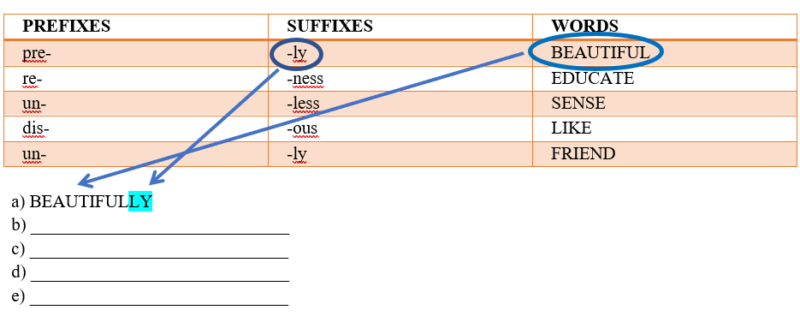AULA 17/2022 – Simple Future / Comparative and Superlative of adjectives - 26/09/2022
SIMPLE FUTURE
O Simple Future da língua inglesa é utilizado para expressar uma ação que ainda não ocorreu, uma previsão futura, um pedido, uma promessa, um aviso, um convite ou uma oferta incerta. Na estrutura do Simple Future utilizamos um verbo auxiliar: WILL. Vejamos a estrutura:
- Affirmative form: Sujeito + will + verbo principal na forma básica + complemento
- Negative form: Sujeito + will not (won’t) + verbo principal na forma básica + complemento
- Question form: Will + sujeito + verbo principal na forma básica + complemento +?
Abaixo temos exemplo de uso do Simple Future em todas as formas possíveis, inclusive nas respostas curtas.
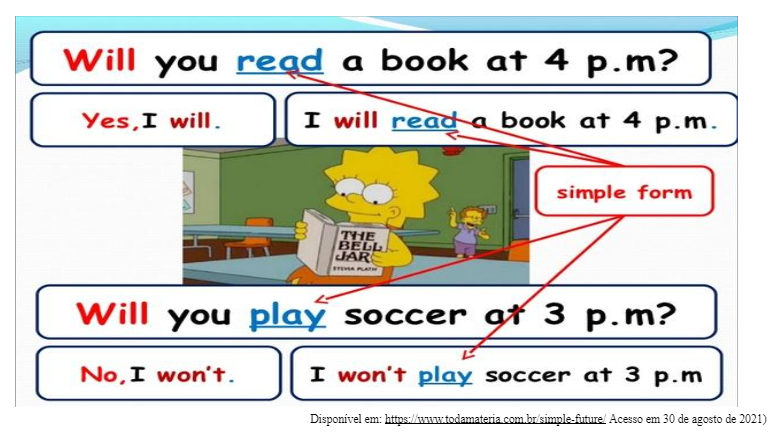
ACTIVITIES (ATIVIDADES)
1. Quando é usado o Simple Future com will em inglês?
2. Como é formada (estrutura) na forma afirmativa do Simple Future com will?
3. Como é a estrutura da forma negativa e interrogativa do Simple Future com will?
4. Fill in the blanks with the Simple Future and the verbs in brackets. (Preencha os espaços em branco com o Simple Future e os verbos entre parênteses.)
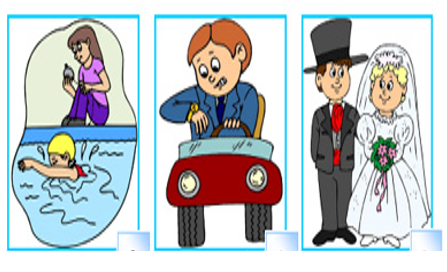
a) Sue is training very hard. I´m sure she ___________________ (break) a new world record.
b) If Peter arrives late at the meeting, his boss ___________________ (be) very angry with him.
c) Paul has promised Mary he ___________________ (love) her forever.
Disponivel em: https://www.google.com.br/search acesso em: 15 de ago. de 2022
Read the text bellow and answer the questions: (Leia o texto abaixo e responda às questões:)
Martha
Tomorrow I think I will stay at home. I will be quite busy. I will clean my house and I will do the laundry. I will eat breakfast and then I will drive my children to school. I will cook a dinner and I will pick my children up from school. I will call my friend. I think I won’t watch TV and I won’t send emails.
In two days I think I will go to work. I will be very busy. I will have a meeting and I will talk to my customers. I hope I will sign a contract. I will also call my business partners and I will write e-mails. I won’t go shopping because I won’t have much time.
Next weekend I will invite my friends to my house. I will organize a small party. I will buy some good food. I will prepare tasty dishes and I will drink some wine. I will talk with my friends about life and films and books. I will have fun. I won’t use my computer. I won’t worry about my work.
Next holiday I will take a week off. I will visit my friend in Croatia. I will stay at her house. I will go to some nice restaurants. I will go to the beach. I will buy some souvenirs and clothes. I will go on trips. I will take a lot of photos. I will meet interesting people. I won’t think about work. I hope I won’t be sick.
Disponível em: https://www.eslprintables.com/grammar_worksheets/verbs/ Acesso em 30 de agosto de 2021.
Vocabulary:
Tomorrow: Amanhã To visit: visitar
Busy: ocupado Week off: semana de folga
To stay: ficar Next Holiday: próximo feriado
To clean: limpar Next weekend: próximo final de semana
Laundry: lavar roupa Write e-mails: escrever e-mails
Cook dinner: cozinhar o jantar Have breakfast: tomar café da manhã
Pick up: pegar Souvenirs: lembranças
To call: ligar To worry: preocupar
To watch: assistir To buy: comprar
Meeting: reunião Take trips: fazer viagens
To talk: falar Meet interesting people: conhecer pessoas
To hope: esperar Get sick: ficar doente
Contract: contrato Movies: filmes
Shopping: compras Invite: convite
5. Martha irá visitar seu amigo em qual país?
6. O que ela não gostaria que acontecesse quando chegasse na casa do seu amigo?
7. Martha escreveu uma espécie de agenda com tudo que ela deseja fazer nos próximos dias. Agora preencha o quadro abaixo com as informações do texto.

8. Mark an “X” TRUE or FALSE according to the text. (Mark an “X” TRUE or FALSE according to the text.)
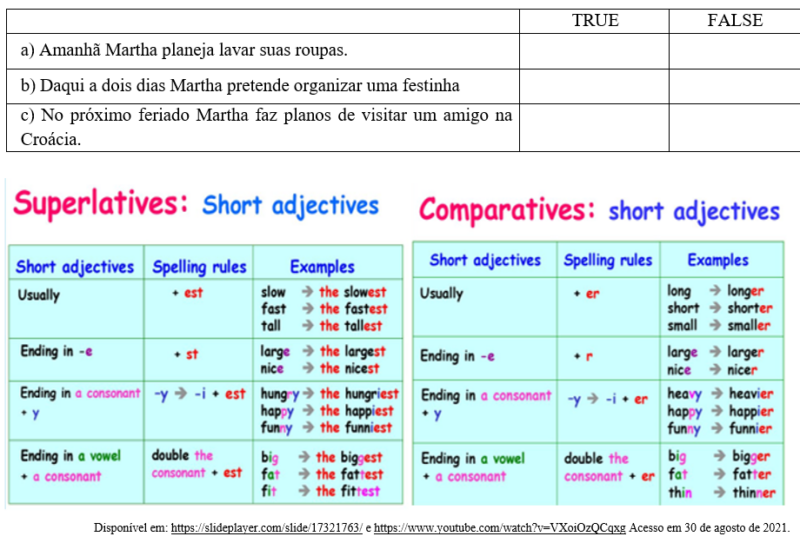
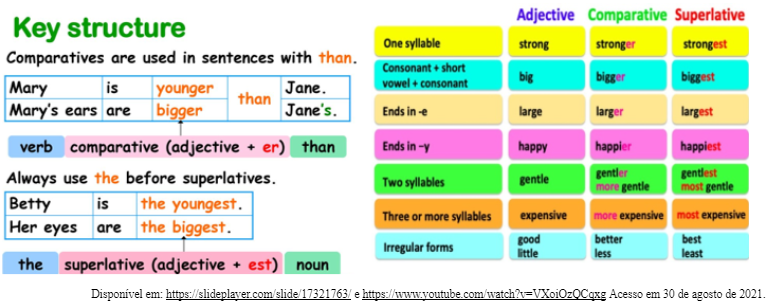
9. Compare these means of transport using the comparative and the superlative. Only one option is correct. (Compare esses meios de transporte usando o comparativo e o superlativo. Apenas uma opção está correta.)
a) The helicopter ___________________.
- is faster than the train.
- is more fast than the train.
- is fastest than the train.
(b) Which is _______________?
- the faster means of transport.
- the fastest means of transport.
- the most fast means of transport.
c) The train ________________.
- is longer than the helicopter.
- is more long than the helicopter.
- is the most longest
d) The bus is ___________________.
- the cheaper means of transport.
- the cheapest means of transport.
- the more cheap means of transport.
e) The helicopter is ______________.
- heavier than the bus.
- more heavy than the bus.
- heaviest than the bus.
f) Which is _______________means of transport?
- the more dangerous.
- the dangerousest.
- the most dangerous.
g) A bus is _____________than a helicopter.
- more light.
- the lightest.
- lighter.
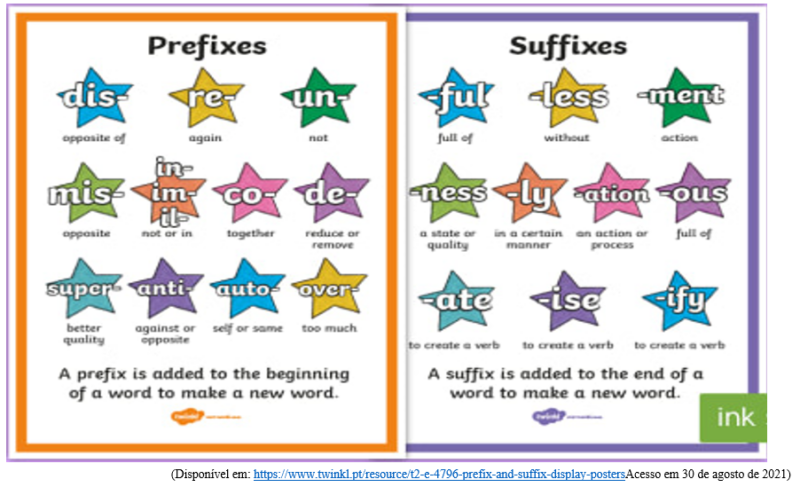
10. A partir das palavras, prefixos e sufixos informados abaixo, forme novas palavras. Observe o exemplo:
